Book contents
2 - Love, Generation, and Political Community (The Symposium)
Published online by Cambridge University Press: 06 January 2010
Summary
Any argument that the philosophic pursuits of Plato's Socrates exemplify an understanding of love and friendship supportive of political life, as I make in this book, must confront the charges against Socrates made by his own political community, the city of Athens. Socrates was accused and found guilty of doing injustice “by corrupting the young, and by not believing in the gods of the city but in new daemonic things” (Apology 24b). Whereas in his Apology of Socrates Plato presents Socrates giving his defense in an Athenian court, his Symposium serves as his own consideration of those charges against Socrates, and I shall argue his own “apology for Socrates.” As Allan Bloom observes, “the accusation of philosophy's destructiveness was made on behalf of the political men and the poets. [The Symposium] is the only place where we see [Socrates] with the poets.” Indeed, one of those poets at the symposium was Aristophanes, whose portrayal of Socrates in the Clouds in 423 BCE fueled the charges against him in 399 (Apology 18c-d). In the Symposium, Socrates accepts a contest with the poets, including Aristophanes (175e, 205e, and 212c). At issue is their respective piety, along with their wisdom. We also see Socrates there with Alcibiades, one of Athens' leading politicians, one who was thought to have been corrupted by Socrates. His was one of the names, according to Xenophon, most frequently mentioned in connection with the accusation that Socrates did “the greatest evils to the city” (Memorabilia I.ii.12).
- Type
- Chapter
- Information
- Socrates on Friendship and CommunityReflections on Plato's Symposium, Phaedrus,andLysis, pp. 25 - 89Publisher: Cambridge University PressPrint publication year: 2008



